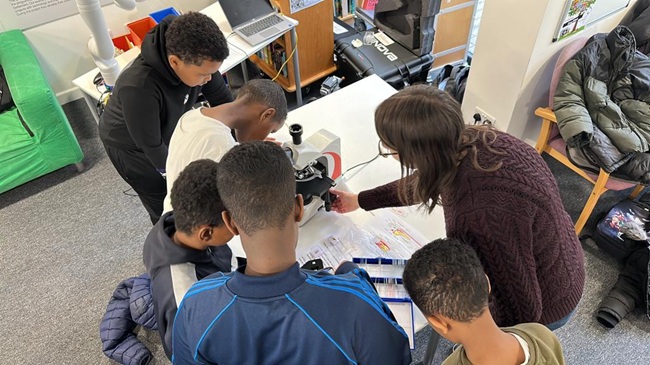Goal 4: Quality education
Ensure inclusive and equitable quality education and promote lifelong learning opportunities for all
Our research
A new study from University of Bristol researchers has helped increase understanding of play, imagination and pretence in very young children. Published in August 2024, the research shows that around half of children are able to pretend by the time they reach one year old. A complex, evolving process of learning and understanding, playing pretend is part of children’s early learning skills, especially in areas related to creativity and social engagement. The work will help teachers and parents better support child development in early years environments.
More children than previously thought may have additional learning needs, researchers from the University’s School of Education and Swansea University have found. Using data on children from Wales born in 2002/03, the team found that nearly half (48%) were identified as having additional learning needs at some point during their school education, which had a significant impact on their learning outcomes. The study suggests that greater support and better inclusivity of learning is needed.
Our students
The 2023/24 academic year saw the launch of the new Bristol Skills Profile, an initiative to help our students build, track and evidence their skills through an interactive online platform. The Profile helps students identify their strengths and weaknesses, and record development across nine key areas, covering skills such as teamwork, problem solving and organisation.
Two Bristol students were among nominees at the Student Social Mobility Awards in 2023, with one winning his subject area category. A staff member was also nominated as a Champion of Social Mobility, while the University’s Bristol Mentors programme was nominated as University Progression Initiative of the Year. The awards aim to recognise the achievements of UK undergraduate students from lower socio-economic backgrounds, and the staff and organisations that support them. They are run by charity upReach.
Our communities
The School of Education partnered with local education charity Trust in Learning in 2024 to support teachers in undertaking research in their classrooms to help improve education for students in Years 6 to 8. Participants were able to come together and share their work, with the projects undertaken looking at areas including developing mathematical reasoning skills, improving collaboration between staff, boosting confident and self-esteem, and interventions to develop writing skills.
Starting in 2023, the University’s School of Education partnered with local community initiative Power Education to help empower and support young people from marginalised backgrounds to succeed in education. The programme offers tutoring in maths, science and English to 11 to 16 year olds from across the city, particularly those from the Somali community, at the University’s Barton Hill Micro-campus, with support from the University’s Widening Participation and Civic Engagement teams. It aims to help more young people from these underrepresented groups secure places at university and reach their potential.
Another initiative to support young people in the Barton Hill area into education celebrated its 10th birthday in 2023. National charity IntoUniversity’s Bristol East project, run in collaboration with the University, was established in 2013. Over the last ten years, it has helped more than 6,400 children and young people to improve academically, gain skills, and develop insight to help them understand their options for the future.

Ourselves
The Bristol Institute for Learning and Teaching (BILT) provides support and training for those new to teaching, as well as ongoing professional development opportunities. In July 2024, BILT held its annual conference, with a focus on student agency, empowerment, and co-creation. Sessions offered staff, students and visitors the chance to share, learn and reflect on issues such as recognising student agency and choices in assessment and feedback, students as partners in learning, and taking inclusive, decolonialised approaches to teaching and curriculum design.
The University’s apprenticeship scheme was recognised at both regional and national level in 2024. Having been awarded The Aptem Social Justice Employer of the Year Award at regional level, the Apprenticeships team earned a nomination for the Department for Education’s National Apprenticeship and Skills Awards. Our eXcelBristol Apprentices programme aims to attract talented people from diverse backgrounds to work at the University, providing entry level career opportunities and ongoing development.
